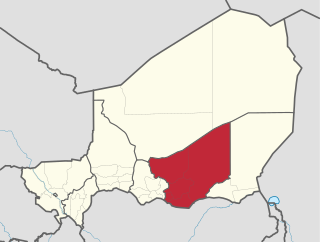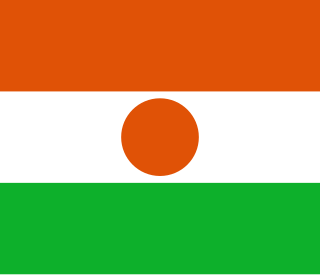
Politics of Niger takes place in a framework of a semi-presidential representative democratic republic, whereby the President of Niger is head of state and the Prime Minister of Niger head of government, and of a multi-party system. Executive power is exercised by the government. Legislative power is vested in both the government and the National Assembly.

Transport in Niger is composed of the transportation systems and methods used in this landlocked nation, with cities separated by huge uninhabited deserts, mountain ranges, and other natural features. A poor nation, Niger's transport system was little developed during the colonial period (1899–1960), relying upon animal transport, human transport, and limited river transport in the far south west and south east. No railways were constructed in the colonial period, and roads outside the capital remained unpaved. The Niger River is unsuitable for large-scale river transport, as it lacks depth for most of the year and is broken by rapids at many spots. Camel caravan transport was historically important in the Sahara desert and Sahel regions which cover most of the north.
Hama Amadou is a Nigerien politician who was Prime Minister of Niger from 1995 to 1996 and again from 2000 to 2007. He was also Secretary-General of the National Movement for the Development of Society (MNSD-Nassara) from 1991 to 2001 and President of the MNSD-Nassara from 2001 to 2009. Amadou is from the Kurtey, a Fula sub-group, and was raised in the Tillaberi Region, in the Niger River valley, north of Niamey.

Lieutenant Colonel (ret.) Mamadou Tandja is a Nigerien politician who was President of Niger from 1999 to 2010. He was President of the National Movement of the Development Society (MNSD) from 1991 to 1999 and unsuccessfully ran as the MNSD's presidential candidate in 1993 and 1996 before being elected to his first term in 1999. While serving as President of Niger, he was also Chairman of the Economic Community of West African States from 2005 to 2007.

Mahamane Ousmane is a Nigerien politician. He was the first democratically elected and fourth President of Niger, serving from 16 April 1993 until his ousting in a military coup d'état on 27 January 1996. He has continued to run for president in each election since his ousting, and he was president of the National Assembly from December 1999 to May 2009. He is the president of the Democratic and Social Convention-Rahama (CDS), a major political party that is currently in opposition.

Zinder Region is an administrative Region in Niger, the capital of the Region is the Commune of Zinder. The Region covers 145,430 km².

The National Movement for the Development of Society is a political party in Niger. Founded under the military government of the 1974-1990 period, it was the ruling party of Niger from 1989 to 1993 and again from 1999 until a coup on February 18, 2010, by a military junta called the Supreme Council for the Restoration of Democracy (CSRD) ousted the president, Mamadou Tandja.

The Democratic and Social Convention - Rahama is a political party in Niger.
Souley Abdoulaye is a Nigerien politician. He served as the Prime Minister of Niger from 28 September 1994 to 8 February 1995. He later served in the government under President Ibrahim Baré Maïnassara as Minister of Transport from 1996 to 1997 and then as Minister of the Interior, in charge of police and internal security, from 1997 to 1999.
Kassaly Daouda is a Nigerien footballer who is a goalkeeper for South African club Chippa United.
Seyni Oumarou is a Nigerien politician who was Prime Minister of Niger from June 2007 to September 2009 and President of the National Assembly of Niger from November 2009 to February 2010. He is from the west of the country and is a member of the Djerma ethnic group. Since November 2008, he has been the President of the National Movement for the Development of Society (MNSD). He unsuccessfully stood as a presidential candidate in 2011 and 2016. After years as an opposition leader under President Mahamadou Issoufou, he was appointed to the post of High Representative of the President in October 2016.
Abdou Labo is a Nigerien politician and a member of the Democratic and Social Convention (CDS-Rahama). He briefly served in the government of Niger as Minister of Defense from 1994 to 1995, and under President Mamadou Tandja he held a succession of ministerial posts in the 2000s: he was Minister of Equipment from 2000 to 2002, Minister of State for Sports and Culture from 2002 to 2004, and Minister of State for Hydraulics from 2004 to 2007. Later, under President Mahamadou Issoufou, he served as Minister of State for the Interior from 2011 to 2013 and as Minister of State for Agriculture from 2013 to 2014.

Abdou Moumouni University was formerly the University of Niamey from 1974 to 1994. On the right bank of the Niger River in Niamey, its students and faculty have historically been involved in protest movements in the capital.
Football is the most popular sport in Niger, a nation of 18 million.

The following outline is provided as an overview of and topical guide to Niger:

The Cabinet of Niger is made up of the appointed heads of Niger's government Ministries. Ministers are chosen from the elected members of the National Assembly of Niger. According to the Constitution of 18 July 1999 the Prime Minister of Niger proposes the membership of the Council of Ministers, and the President of Niger appoints the Ministers, which is then authorized by the National Assembly. The Council of ministers meets at the discretion of the President, advises him on policy, and carries out the policies he orders. The Council of Ministers is headed by the Prime Minister of Niger, who is put forward by the National Assembly, and accepted by the President. The Assembly may remove the Prime minister by a vote of no confidence.

The 2009–2010 Nigerien constitutional crisis occurred in Niger due to a political conflict between President Mamadou Tandja and judicial and legislative bodies regarding the Constitutional referendum that opponents claimed was an attempt to extend his mandate beyond the constitutional maximum. It was held on 4 August 2009 before a parliamentary election which was mandated to take place by 26 August 2009. The crisis eventually led to a coup d'état by military leaders who overthrew President Tandja and formed a ruling junta.
Daouda Sow was a Senegalese politician and legislator. He served as the President of the National Assembly of Senegal from 1984 to 1998. He was a member of the Socialist Party of Senegal (PS) and served as the party's Secretary General.









